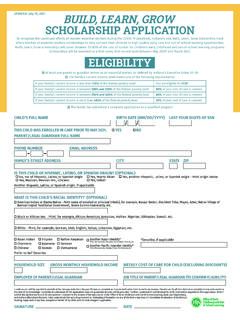Transcription of From The Interpreter of Maladies, 1999 - Cornell University
1 From The Interpreter of Maladies, 1999 The Third and Final Continent by Jhumpa Lahiri I left India in 1964 with a certificate in commerce and the equivalent, in those days, of ten dollars to my name. For three weeks I sailed on the Roma, an italian cargo vessel, in a cabin next to the ship's engine, across the Arabian Sea, the Red Sea, the Mediterranean, and finally to England. I lived in London, in Finsbury Park, in a house occupied entirely by penniless Bengali bachelors like myself, at least a dozen and sometimes more, all struggling to educate and establish ourselves abroad. I attended lectures at and worked at the University library to get by. We lived three or four to a room, shared a single, icy toilet, and took turns cooking pots of egg curry, which we ate with our hands on a table covered with newspapers. Apart from our jobs we had few responsibilities. On weekends we lounged barefoot in drawstring pajamas, drinking tea and smoking Rothmans, or set out to watch cricket at Lord's.
2 Some weekends the house was crammed with still more Bengalis, to whom we had introduced ourselves at the greengrocer, or on the Tube, and we made yet more egg curry, and played Mukesh on a Grundig reel-to-reel, and soaked our dirty dishes in the bathtub. Every now and then someone in the house moved out, to live with a woman whom his family back in Calcutta had determined he was to wed. In 1969, when I was thirty-six years old, my own marriage was arranged. Around the same time, I was offered a full-time job in America, in the processing department of a library at The salary was generous enough to support a wife, and I was honored to be hired by a world-famous University , and so I obtained a green card, and prepared to travel farther still. By then I had enough money to go by plane. I flew first to Calcutta, to attend my wedding, and a week later to Boston, to begin my new job. During the flight I read "The Student Guide to North America," for although I was no longer a student, I was on a budget all the same.
3 I learned that Americans drove on the right side of the road, not the left, and that they called a lift an elevator and an engaged phone busy. "The pace of life in North America is different from Britain, as you will soon discover," the guidebook informed me. "Everybody feels he must get to the top. Don't expect an English cup of tea." As the plane began its descent over Boston Harbor, the pilot announced the weather and the time, and that President Nixon had Lahiri/The Third and Final Continent/2 declared a national holiday: two American men had landed on the moon. Several passengers cheered. "God bless America!" one of them hollered. Across the aisle, I saw a woman praying. I spent my first night at the in Central Square, Cambridge, an inexpensive accommodation recommended by my guidebook which was within walking distance of The room contained a cot, a desk, and a small wooden cross on one wall. A sign on the door said that cooking was strictly forbidden.
4 A bare window overlooked Massachusetts Avenue. Car horns, shrill and prolonged, blared one after another. Sirens and flashing lights heralded endless emergencies, and a succession of buses rumbled past, their doors opening and closing with a powerful hiss, throughout the night. The noise was constantly distracting, at times suffocating. I felt it deep in my ribs, just as I had felt the furious drone of the engine on the Roma. But there was no ship's deck to escape to, no glittering ocean to thrill my soul, no breeze to cool my face, no one to talk to. I was too tired to pace the gloomy corridors of the in my pajamas. Instead I sat at the desk and stared out the window. In the morning I reported to my job at the Dewey Library, a beige fortlike building by Memorial Drive. I also opened a bank account, rented a post-office box, and bought a plastic bowl and a spoon. I went to a supermarket called Purity Supreme, wandering up and down the aisles, comparing prices with those in England.
5 In the end I bought a carton of milk and a box of cornflakes. This was my first meal in America. Even the simple chore of buying milk was new to me; in London we'd had bottles delivered each morning to our door. In a week I had adjusted, more or less. I ate cornflakes and milk morning and night, and bought some bananas for variety, slicing them into the bowl with the edge of my spoon. I left my carton of milk on the shaded part of the windowsill, as I had seen other residents at the do. To pass the time in the evenings I read the Boston Globe downstairs, in a spacious room with stained-glass windows. I read every article and advertisement, so that I would grow familiar with things, and when my eyes grew tired I slept. Only I did not sleep well. Each night I had to keep the window wide open; it was the only source of air in the stifling room, and the noise was intolerable. I would lie on the cot with my fingers pressed into my ears, but when I drifted off to sleep my hands fell away, and the noise of the traffic would wake me up again.
6 Pigeon feathers drifted onto the windowsill, and one evening, when I poured milk over my cornflakes, I saw that it had soured. Nevertheless I resolved to stay at the for six weeks, until my wife's passport and green card were ready. Once she arrived I would have to rent a proper apartment, and from time to time I studied the classified section of the newspaper, Lahiri/The Third and Final Continent/3 or stopped in at the housing office at during my lunch break to see what was available. It was in this manner that I discovered a room for immediate occupancy, in a house on a quiet street, the listing said, for eight dollars per week. I dialled the number from a pay telephone, sorting through the coins, with which I was still unfamiliar, smaller and lighter than shillings, heavier and brighter than paisas. "Who is speaking?" a woman demanded. Her voice was bold and clamorous. "Yes, good afternoon, Madam. I am calling about the room for rent.
7 " "Harvard or Tech?" "I beg your pardon?" "Are you from Harvard or Tech?" Gathering that Tech referred to the Massachusetts Institute of Technology, I replied, "I work at Dewey Library," adding tentatively, "at Tech." "I only rent rooms to boys from Harvard or Tech!" "Yes, Madam." I was given an address and an appointment for seven o'clock that evening. Thirty minutes before the hour I set out, my guidebook in my pocket, my breath fresh with Listerine. I turned down a street shaded with trees, perpendicular to Massachusetts Avenue. In spite of the heat I wore a coat and tie, regarding the event as I would any other interview; I had never lived in the home of a person who was not Indian. The house, surrounded by a chain-link fence, was off-white with dark-brown trim, with a tangle of forsythia bushes plastered against its front and sides. When I pressed the bell, the woman with whom I had spoken on the phone hollered from what seemed to be just the other side of the door, "One minute, please!
8 " Several minutes later the door was opened by a tiny, extremely old woman. A mass of snowy hair was arranged like a small sack on top of her head. As I stepped into the house she sat down on a wooden bench positioned at the bottom of a narrow carpeted staircase. Once she was settled on the bench, in a small pool of light, she peered up at me, giving me her undivided attention. She wore a long black skirt that spread like a stiff tent to the floor, and a starched white shirt edged with ruffles Lahiri/The Third and Final Continent/4 at the throat and cuffs. Her hands, folded together in her lap, had long pallid fingers, with swollen knuckles and tough yellow nails. Age had battered her features so that she almost resembled a man, with sharp, shrunken eyes and prominent creases on either side of her nose. Her lips, chapped and faded, had nearly disappeared, and her eyebrows were missing altogether. Nevertheless she looked fierce.
9 "Lock up!" she commanded. She shouted even though I stood only a few feet away. "Fasten the chain and firmly press that button on the knob! This is the first thing you shall do when you enter, is that clear?" I locked the door as directed and examined the house. Next to the bench was a small round table, its legs fully concealed, much like the woman's, by a skirt of lace. The table held a lamp, a transistor radio, a leather change purse with a silver clasp, and a telephone. A thick wooden cane was propped against one side. There was a parlor to my right, lined with bookcases and filled with shabby claw-footed furniture. In the corner of the parlor I saw a grand piano with its top down, piled with papers. The piano's bench was missing; it seemed to be the one on which the woman was sitting. Somewhere in the house a clock chimed seven times. "You're punctual!" the woman proclaimed. "I expect you shall be so with the rent!" "I have a letter, Madam.
10 " In my jacket pocket was a letter from confirming my employment, which I had brought along to prove that I was indeed from Tech. She stared at the letter, then handed it back to me carefully, gripping it with her fingers as if it were a plate heaped with food. She did not wear glasses, and I wondered if she'd read a word of it. "The last boy was always late! Still owes me eight dollars! Harvard boys aren't what they used to be! Only Harvard and Tech in this house! How's Tech, boy?" "It is very well." "You checked the lock?" "Yes, Madam." She unclasped her fingers, slapped the space beside her on the bench with one hand, and told me to sit down. For a moment she was silent. Then she intoned, as if she alone possessed this knowledge: Lahiri/The Third and Final Continent/5 "There is an American flag on the moon!" "Yes, Madam." Until then I had not thought very much about the moon shot. It was in the newspaper, of course, article upon article.





